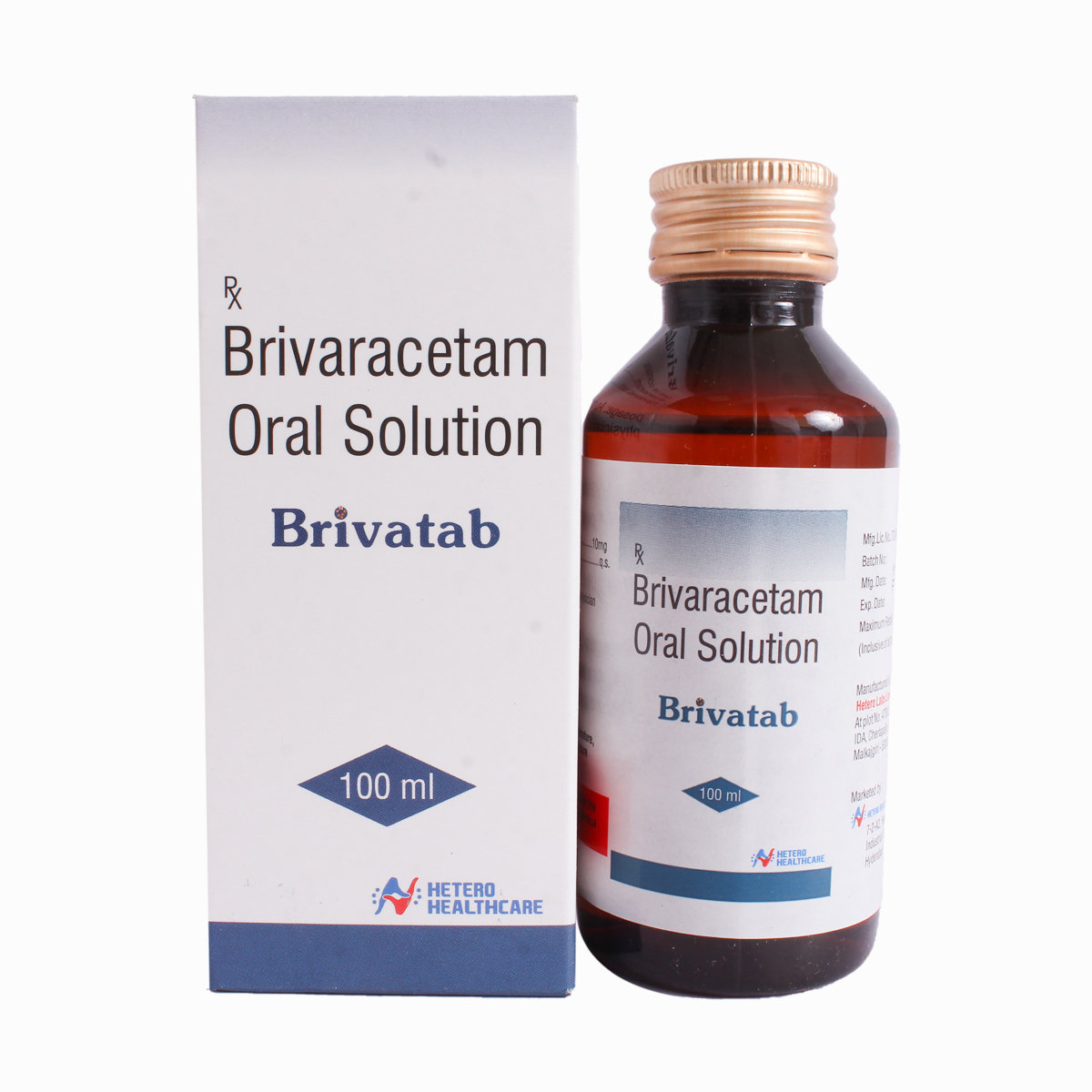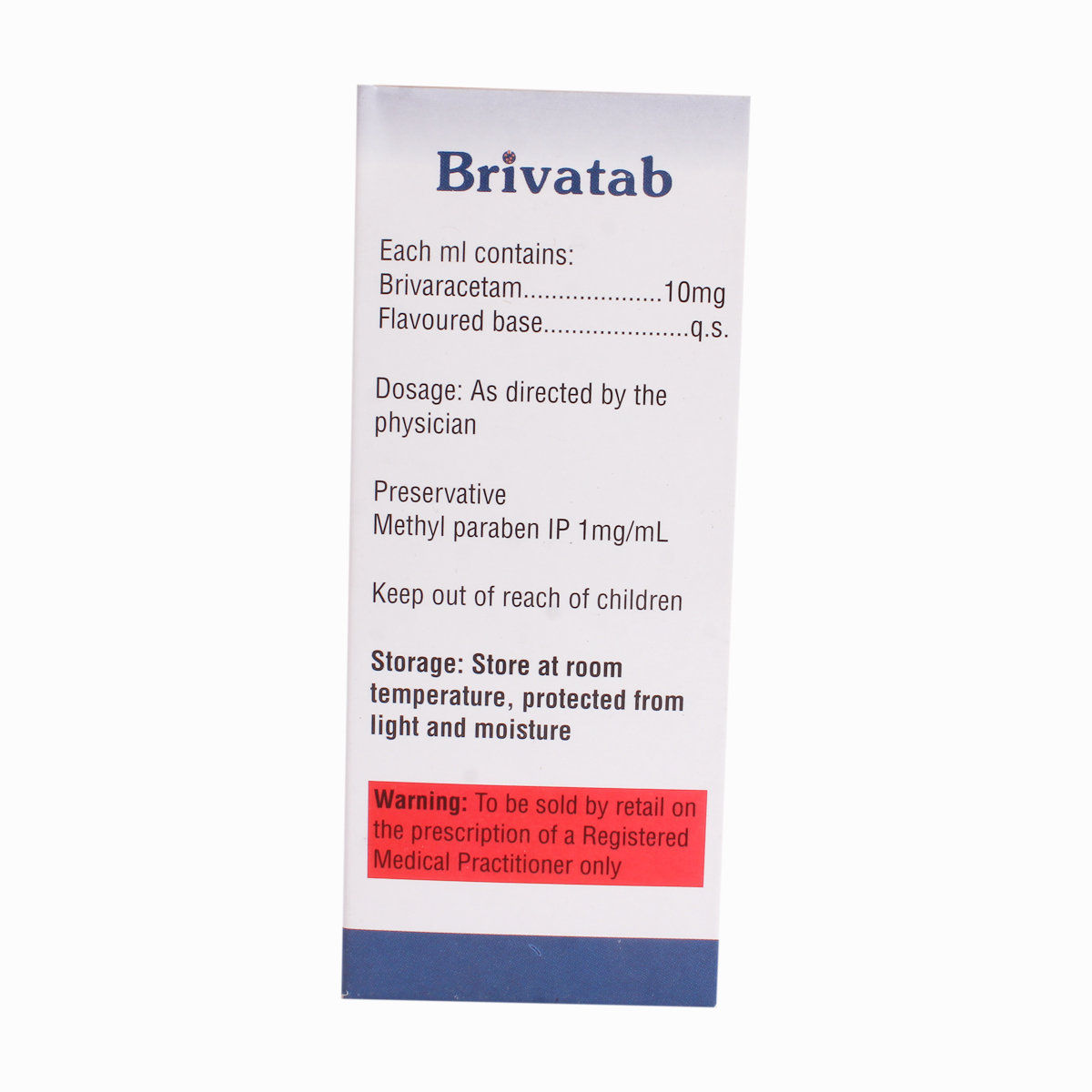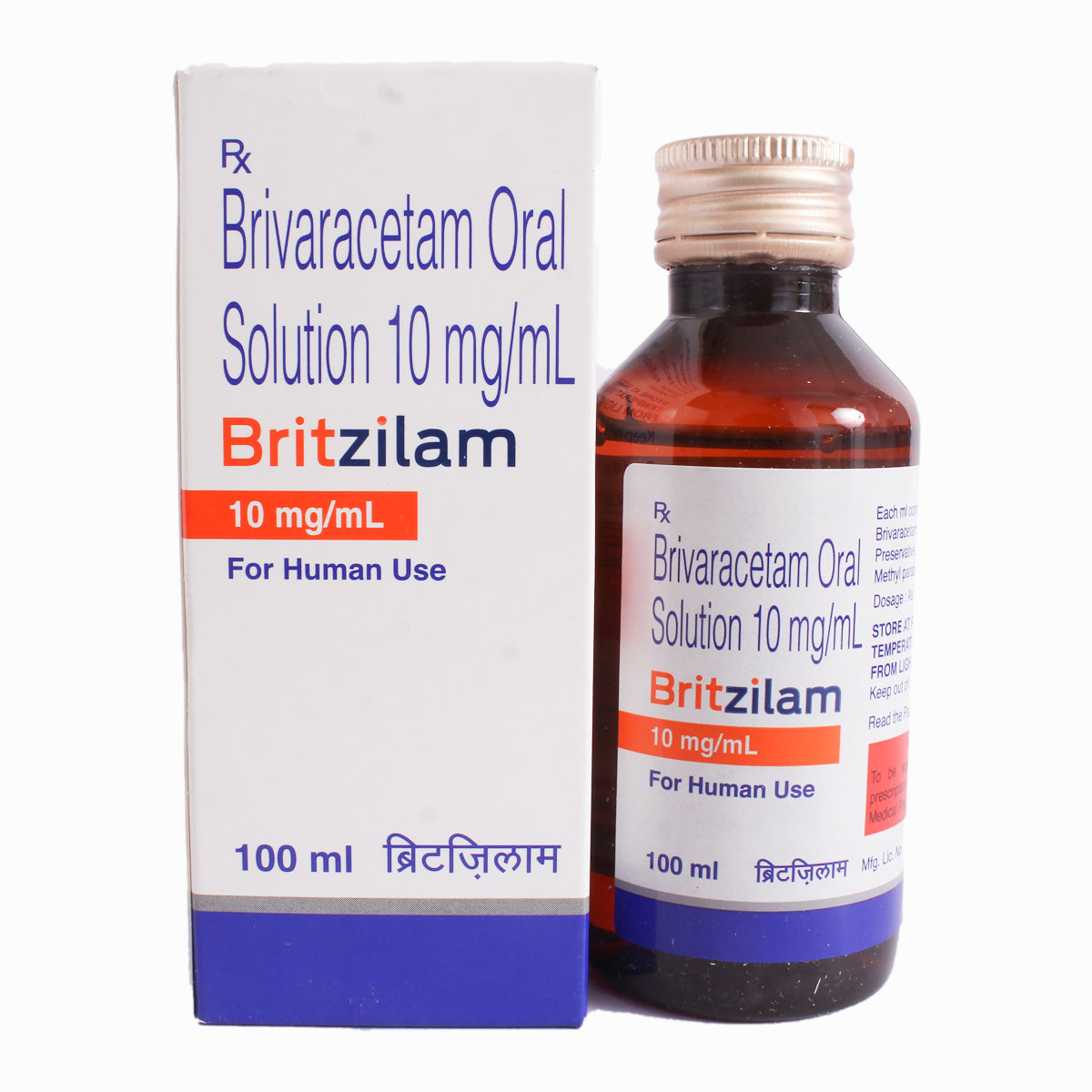Brivatab 10 Oral Solution 100 ml
MRP ₹350
(Inclusive of all Taxes)
₹52.5 Cashback (15%)
Provide Delivery Location
Online payment accepted
 Prescription drug
Prescription drugWhats That
Composition :
Manufacturer/Marketer :
Consume Type :
Expires on or after :
Return Policy :
About Brivatab 10 Oral Solution
Brivatab 10 Oral Solution belongs to a group of medications called 'anti-convulsants'. It is used for treating partial-onset seizures (seizures involving only one part of the brain) in people with epilepsy (fits) in patients one month of age and older. Partial-onset seizures are characterized by abnormal electrical activity in only one brain hemisphere. Common symptoms are involuntary muscle contractions, followed by relaxation on one side of the body, uncontrolled head or eye movements, rapid heart rate, and a tingling sensation on the skin.
Brivatab 10 Oral Solution contains '‘Brivaracetam' that reduces the electrical impulses and subsequent firing of the nerve impulses that cause fits. Thus, Brivatab 10 Oral Solution decreases the brain's excessive and abnormal nerve activity, thereby controlling seizures.
Brivatab 10 Oral Solution should be used as prescribed by the doctor. In some cases, you may experience certain common side effects such as somnolence (excess sleepiness), dizziness, fatigue (feeling overtired), nausea and vomiting. Most of these side effects do not require medical attention and will resolve gradually over time. However, you are advised to talk to your doctor if you experience these side effects persistently.
To treat your condition effectually, continue taking Brivatab 10 Oral Solution for as long as your doctor has prescribed. Brivatab 10 Oral Solution should be gradually withdrawn, so please do not stop taking Brivatab 10 Oral Solution without consulting your doctor. Before taking the Brivatab 10 Oral Solution , let your doctor know about all your medical conditions, sensitivities, and all medications you are using. Inform your doctor if you are pregnant or planning to become pregnant. You should not breastfeed unless the doctor advises. Consult your doctor immediately if you experience suicidal tendencies. It is recommended not to drive or operate machinery as Brivatab 10 Oral Solution may cause tiredness and fatigue. It is recommended not to take alcoholic beverages while on Brivaracetam therapy.
Uses of Brivatab 10 Oral Solution
Directions for Use
Key Benefits
Brivatab 10 Oral Solution belongs to a group of medicines called anticonvulsants or anti-epileptics used to control partial-onset seizures in the treatment of epilepsy (fits). Brivatab 10 Oral Solution consists of ‘Brivaracetam' that works by reducing the electrical impulses and subsequent firing of the nerve impulses that cause fits. Brivatab 10 Oral Solution decreases the excessive and abnormal nerve activity in the brain, thereby helping in controlling seizures.
Storage
- Inform your doctor about dizziness symptoms. They may adjust your medication regimen or prescribe additional medications to manage symptoms.
- Follow your doctor's instructions for taking medication, and take it at the same time every day to minimize dizziness.
- When standing up, do so slowly and carefully to avoid sudden dizziness.
- Avoid making sudden movements, such as turning or bending quickly, which can exacerbate dizziness.
- Drink plenty of water throughout the day to stay hydrated and help alleviate dizziness symptoms.
- If you're feeling dizzy, sit or lie down and rest until the dizziness passes.
- Track when dizziness occurs and any factors that may trigger it, and share this information with your doctor to help manage symptoms.
- Avoid driving or operating machinery or activities that require high focus until you know how the medication affects you.
- Maintain a fixed sleeping schedule, create a relaxing bedtime routine and ensure your sleeping space is comfortable to maximize your sleep quality.
- Limit alcohol and caffeine as these may worsen drowsiness and disturb sleep patterns.
- Drink plenty of water as it helps with alertness and keeps you hydrated and for overall well-being.
- Moderate physical activity can improve energy levels, but avoid intense workouts right before bedtime.
- Inform your doctor about the nausea and discuss possible alternatives to the medication or adjustments to the dosage.
- Divide your daily food intake into smaller, more frequent meals to reduce nausea.
- Opt for bland, easily digestible foods like crackers, toast, plain rice, bananas, and applesauce.
- Avoid certain foods that can trigger nausea, such as fatty, greasy, spicy, and smelly foods.
- Drink plenty of fluids, such as water, clear broth, or electrolyte-rich beverages like coconut water or sports drinks.
- Use ginger (tea, ale, or candies) to help relieve nausea.
- Get adequate rest and also avoid strenuous activities that can worsen nausea.
- Talk to your doctor about taking anti-nausea medication if your nausea is severe.
- Record when your nausea occurs, what triggers it, and what provides relief to help you identify patterns and manage your symptoms more effectively.
- Preventing Vomiting (Before it Happens)
- Take medication exactly as prescribed by your doctor. This can help minimize side effects, including vomiting.
- Having a small meal before taking your medication can help reduce nausea and vomiting.
- Talk to your doctor about taking anti-nausea medication along with your prescribed medication.
- Managing Vomiting (If it Happens)
- Try taking ginger in the form of tea, ale, or candy to help alleviate nausea and vomiting.
- What to Do if Vomiting Persists
- Consult your doctor if vomiting continues or worsens, consult the doctor for guidance on adjusting your medication or additional treatment.
- Remember, managing depression as a side effect of medication requires patience, persistence, and collaboration with your healthcare team.
- Tell your doctor about your depression symptoms to adjust medication.
- Consult a therapist or counsel for emotional support.
- Engage in regular exercise to release endorphins (neurotransmitters).
- Practice stress-reducing techniques like meditation and deep breathing.
- Build a support network of friends, family, and support groups.
- Establish a consistent sleep schedule.
- Eat a nutritious diet rich in fruits, vegetables, and whole grains.
- Limit or avoid alcohol and recreational substances.
- Keep a mood journal to track symptoms and progress.
- Prepare for a restful night's sleep: Develop a calming pre-sleep routine, like reading or meditation, to help your body relax and prepare for sleep.
- Create a sleep-conducive Environment: Make bedroom a sleep haven by ensuring it is quiet, dark and calm.
- Follow a Sleep Schedule: Go to bed and get up at the same time every day to help regulate your body's internal clock and increase sleep quality.
- Try relaxing techniques like deep breathing, mindfulness meditation and any others.
- Limit stimulating activities before bedtime: Avoid stimulating activities before bedtime to improve sleep quality.
- Monitor Progress: Keep track of your sleep patterns to identify areas for improvement.
- Consult a doctor if needed: If these steps don't improve your sleep, consult a doctor for further guidance and therapy.
- Inform your doctor about dizziness symptoms. They may adjust your medication regimen or prescribe additional medications to manage symptoms.
- Follow your doctor's instructions for taking medication, and take it at the same time every day to minimize dizziness.
- When standing up, do so slowly and carefully to avoid sudden dizziness.
- Avoid making sudden movements, such as turning or bending quickly, which can exacerbate dizziness.
- Drink plenty of water throughout the day to stay hydrated and help alleviate dizziness symptoms.
- If you're feeling dizzy, sit or lie down and rest until the dizziness passes.
- Track when dizziness occurs and any factors that may trigger it, and share this information with your doctor to help manage symptoms.
Drug Warnings
Before taking the Brivatab 10 Oral Solution , inform your doctor about all your medical conditions, allergic conditions, and all medications you are using. Inform your doctor if you are pregnant or planning to become pregnant. If you become pregnant while taking Brivatab 10 Oral Solution , call your doctor. You should not breastfeed unless the doctor advises. Consult your doctor immediately if you experience suicidal tendencies or feel it worsens your condition. It is recommended not to drive or operate machinery as Brivatab 10 Oral Solution may cause tiredness and fatigue. It is recommended not to take alcoholic beverages while on Brivaracetam therapy. Do not stop Brivatab 10 Oral Solution without first talking to a healthcare provider. Stopping the usage of Brivatab 10 Oral Solution suddenly can cause serious problems. Sometimes, it may lead to seizures that will not stop (status epilepticus).
Drug-Drug Interactions
Drug-Drug Interactions
Login/Sign Up
Co-administration of Brivatab 10 Oral Solution 100 ml with Esketamine may increase side effects such as drowsiness, difficulty concentrating, confusion, and impairment in thinking, judgment, reaction speed, and motor coordination.
How to manage the interaction:
Although there is an interaction, Brivatab 10 Oral Solution 100 ml can be taken with Esketamine if prescribed by the doctor. Consult the prescriber if you notice drowsiness, difficulty concentrating, confusion, and impairment in thinking, judgment, reaction speed, and motor coordination. Do not discontinue the medication without consulting a doctor
Co-administration of Brivatab 10 Oral Solution 100 ml with Ketamine may increase side effects such as drowsiness, difficulty concentrating, confusion, and impairment in thinking, judgment, reaction speed, and motor coordination.
How to manage the interaction:
Although there is a possible interaction between Brivatab 10 Oral Solution 100 ml and Ketamine, you can take these medicines together if prescribed by a doctor. If you notice any of these signs - feeling dizzy, sleepy, confused, having trouble focusing, feeling too relaxed, or having trouble breathing - make sure to contact adoctor right away. Do not stop using any medications without talking to a doctor.
Brimonidine may be absorbed into the bloodstream and occasionally produce central nervous system side effects such as dizziness, drowsiness, and difficulty concentrating. Concomitant use of Brivatab 10 Oral Solution 100 ml with brimonidine may increase the risk of these side effects.
How to manage the interaction:
Although there is an interaction Brivatab 10 Oral Solution 100 ml can be taken with brimonidine if prescribed by the doctor. Consult the prescriber if you notice dizziness, drowsiness, and difficulty concentrating.
Drug-Food Interactions
Drug-Food Interactions
Login/Sign Up
Diet & Lifestyle Advise
- A ketogenic diet (low in carbohydrates and high in fats) is recommended for children with epilepsy. This diet helps utilise fat instead of glucose for energy generation.
- Atkins diet (high fat and controlled carbohydrates) is recommended for adolescents and adults.
- Exercising regularly helps in maintaining weight and improving overall health.
- Rest well, and get plenty of sleep.
- Avoid smoking and alcohol consumption.
- Meditation and yoga can help lower stress, decrease pain sensitivity and improves coping skills.
- Have a seizure response plan, and help those around you know what to do.
- Prepare your living area; small changes may reduce the risk of physical injury during a seizure.
- Understand what triggers seizures are and try reducing or avoiding them.
- Please pay attention to overall health, as it can help reduce seizure activity.
- Install an alarm or emergency device to get assistance during a seizure attack.
Side Effects of Brivatab 10 Oral Solution
- Drowsiness
- Tiredness
- Fatigue
- Asthenia (weakness)
- Malaise (General discomfort)
- Hypersomnia (Excessive sleepiness)
- Sedation
- Lethargy (a lack of energy)
- Dizziness
- Vertigo (Spinning sensation)
- Balance disorder
- Ataxia (Impaired coordination)
- Nystagmus (Involuntary eye movement)
- Gait disturbance (a manner of walking or moving on foot)
- Abnormal coordination
Habit Forming
Therapeutic Class
All Substitutes & Brand Comparisons
RX
Britzilam Oral Solution 100 ml
Torrent Pharmaceuticals Ltd
₹396
(₹3.56/ 1ml)
13% COSTLIERRX
Brivajoy 10mg/ml Solution 100 ml
Abbott India Ltd
₹407
(₹3.66/ 1ml)
16% COSTLIERRX
Brivanext Oral Solution 100 ml
Msn Laboratories Pvt Ltd
₹421.5
(₹3.79/ 1ml)
20% COSTLIER
Author Details
We provide you with authentic, trustworthy and relevant information
Drug-Diseases Interactions
Drug-Diseases Interactions
Login/Sign Up
Brivatab 10 Oral Solution 100 ml which treat epilepsy, have been linked to an elevated risk of suicidal ideas or actions in individuals taking them for any reason. A dosage reduction or therapy termination should be taken into consideration if patients exhibit signs of suicidal ideation or behaviour.
How to manage the interaction:
Anti-epileptic drugs have been associated with an increased risk of suicidal thoughts or behavior. It should be administered with caution in patients with depression or other psychiatric disorders. Consult the doctor if you notice signs and symptoms of depression, any unusual changes in mood or behavior, or the emergence of suicidal thoughts or behavior. If patients have symptoms of suicidal ideation or behavior, a dosage reduction or treatment discontinuation should be considered.
Patients taking Brivatab 10 Oral Solution 100 ml have been documented to experience bronchospasm and angioedema, and a hypersensitive reaction to this medication could put patients at danger. Brivatab 10 Oral Solution 100 ml should be used with caution in patients who are prone to bronchospasm and angioedema.
How to manage the interaction:
Bronchospasm (tightening of muscles in the airways) and angioedema (swelling) have been reported in patients taking Brivatab 10 Oral Solution 100 ml. Caution is advised when using Brivatab 10 Oral Solution 100 ml in patients with bronchospasm and angioedema.
In the liver, Brivatab 10 Oral Solution 100 ml is largely metabolised via hydrolysis. In comparison to matched healthy controls, Brivatab 10 Oral Solution 100 ml exposure increased by 50%, 57%, and 59%, respectively, in adult patients with hepatic cirrhosis and Child-Pugh categories A, B, and C. According to the manufacturer's prescription, dosage adjustment is advised for all stages of hepatic impairment due to increases in Brivatab 10 Oral Solution 100 ml exposure. When administering this medication to patients with liver illness, caution and close observation are advised.
How to manage the interaction:
Dosage adjustment is recommended for all stages of hepatic impairment. Care and close monitoring is advised when using this medicine in patients with liver disease.
Patients with compromised renal function do not require dose modifications. As there are no data in this patient population, Brivatab 10 Oral Solution 100 ml is not advised for use in patients with end-stage renal disease receiving dialysis.
How to manage the interaction:
The use of Brivatab 10 Oral Solution 100 ml is not recommended in patients with end-stage renal disease undergoing dialysis as there are no data in this patient population.
FAQs
Drug-Drug Interactions Checker List
- CARBAMAZEPINE
- PHENYTOIN
- LEVETIRACETAM
- RIFAMPICIN
- BUPRENORPHINE
- PROPOXYPHENE
- KETAMINE
- ESKETAMINE
- SODIUM OXYBATE
Special Advise
- Pay close attention to any changes in mood, behaviour, thoughts, or feelings, especially if they are sudden.
- Maintain all scheduled follow-up appointments with your healthcare practitioner.
Disease/Condition Glossary
Partial-onset seizures: Partial-onset seizures are characterized by abnormal electrical activity in only one brain hemisphere. Common symptoms are involuntary muscle contractions, followed by relaxation on one side of the body, Hallucinations, uncontrolled head or eye movements, rapid heart rate, and a tingling sensation on the skin. The symptoms vary in each patient depending on the part of the brain affected.

Have a query?
Alcohol
Safe if prescribed
It is unsafe to consume alcohol since it may worsen the side effects like dizziness and sleepiness.
Pregnancy
Consult your doctor
There are no adequate and well-controlled studies on pregnant women. Inform your doctor before receiving the Brivatab 10 Oral Solution if you are pregnant or planning to become pregnant. Your doctor will prescribe only if the benefits outweigh the risks.
Breast Feeding
Consult your doctor
There has been no significant research on using Brivatab 10 Oral Solution in breastfeeding/nursing moms. So, let your doctor know if you are a nursing mother before taking Brivatab 10 Oral Solution ; your doctor will decide whether Brivatab 10 Oral Solution can be taken by breastfeeding mothers.
Driving
Safe if prescribed
Brivatab 10 Oral Solution may cause somnolence (excess sleepiness) and fatigue (feeling overtired). It impacts your daily activities; hence avoid driving in such situations. Seek medical attention if the symptoms persist longer.
Liver
Consult your doctor
Dose adjustments may be needed. So inform your doctor before receiving the Brivatab 10 Oral Solution if you have a history of liver impairments.
Kidney
Consult your doctor
Brivatab 10 Oral Solution is not recommended to be used in end-stage renal disease patients undergoing dialysis. Inform your doctor before receiving the Brivatab 10 Oral Solution if you have a history of kidney diseases/conditions.
Children
Safe if prescribed
Your doctor will prescribe only if the benefits outweigh the risks.














